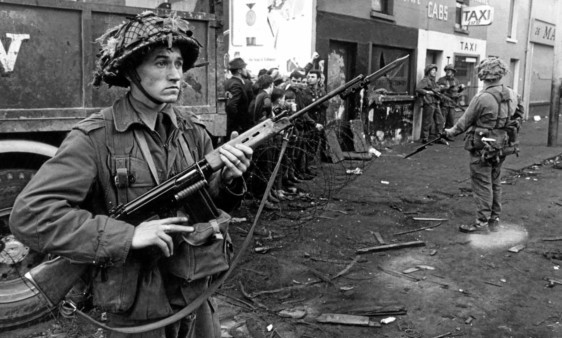
It takes a very brave, or some might say very foolish, man to offer an opinion to the media that’s the polar opposite to those he wishes to reach out to.
An opinion he knows will enrage and hurt many, but one he firmly believes will spark real debate.
It’s even more risky when that opinion is about the Troubles in Northern Ireland, suggesting a line should be drawn and all police investigations into killings that took place before the Good Friday Agreement of 1998 be dropped.
Step forward brave Paul Larkin, Attorney General for Northern Ireland.
He has voiced what many people in Ireland north and south and indeed the UK have been thinking for years. That the time has now come to move on and the Troubles be consigned to the history books.
Of course that’s easier said than done, bearing in mind Northern Ireland’s history could be considered the catalyst for the Troubles in the first place, and that history continues to play its part in stirring up deep division and hatred in some quarters.
But the signs are there that the vast, though silent, majority don’t subscribe to these militant views and that they prefer to get along rather than use the bomb or the bullet.
The victims’ families, of which there are too many on all sides, have understandably condemned Mr Larkin.
They are outraged. As one furious father put it: “How dare he airbrush the innocent people who were murdered at the hands of the terrorists to move things forward.”
Amnesty International have also called his proposal “an utter betrayal of victims’ fundamental rights to access justice”. David Cameron mused that it was “rather dangerous”.
And they do have a massive point it is a huge issue.
I too would be outraged if my family were killed by terrorists or the British Army and I would also be seeking justice, rough or otherwise.
But when do the recriminations, investigations and inquiries stop? When is the past allowed to be the past?
We quickly moved on from hunting and hating Germans and Japanese after two world wars that killed millions, so why can’t we do that here?
The crimes committed in these global conflicts were arguably worse than any carried out in Northern Ireland.
So let’s be clear the Troubles was a war, a dirty, awful conflict that killed and maimed thousands on all sides.
But we shouldn’t forget that those we saw as terrorists were seen by their own as soldiers, regardless of how distasteful that may seem. And if the war is over then the “soldiers” on all sides should be allowed to demob and rejoin civvy street.
UK troops should also be allowed a pardon or amnesty and not live their lives frightened that at any moment they will be picked up and dragged through the courts. They went through enough over there.
As a friend who lives in Derry said to me: “We accepted years ago that there were British Army murder squads operating, but every side had them. Let’s move on!”
I agree, and my final point is this: if the Good Friday Agreement was signed in good faith with the understanding that those convicted of terrorism would only serve two years providing the groups they belonged to maintained a ceasefire and decommissioned their arms, why do Mr Larkin’s comments cause such offence?
The peace process should be well over by now. Why is it taking so long?
It’s nearly Christmas so I’m reminded of John Lennon who famously sang War Is Over. He also sang: “All we are saying, is give peace a chance”.
Well in Ireland the peace is there . . . but the chance could be slipping away.

Enjoy the convenience of having The Sunday Post delivered as a digital ePaper straight to your smartphone, tablet or computer.
Subscribe for only £5.49 a month and enjoy all the benefits of the printed paper as a digital replica.
Subscribe